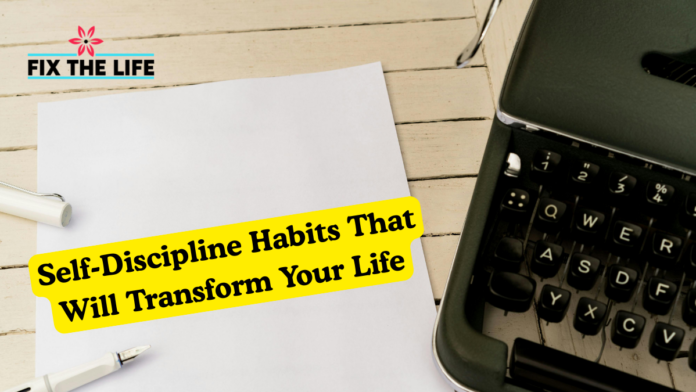Self-discipline isn’t about punishment—it’s about power. It’s the ability to follow through on what matters, even when motivation fades. Whether you want to level up your career, improve your health, or achieve long-term goals, the right habits make all the difference.
These self-discipline habits that change your life are grounded in real-world success stories, behavioral science, and simple but effective consistency tips.
7 Best Self-Discipline Habits
1. Start Your Day With Intention, Not Reaction
Mornings set the tone. If you start by checking your phone, reacting to emails, or scrolling social media, you immediately put yourself on defense.
What to do instead: Begin your day with a short routine that puts you in control—whether that’s journaling, stretching, reviewing your goals, or simply making your bed.
Evidence: Research from the American Psychological Association shows that morning routines reduce stress and improve emotional regulation.
2. Master the Art of Saying No
Discipline isn’t just about doing more—it’s about cutting what doesn’t matter. Every time you say yes to something unimportant, you say no to your bigger priorities.
Example: Saying no to an extra streaming binge means saying yes to quality sleep or reading.
Consistency tip: Set clear boundaries around your time and energy. If it’s not a “hell yes,” it’s a no.
3. Follow the Rule of One: Focus on One Thing at a Time
Multitasking looks productive but often leads to burnout and lower-quality results. Real discipline means giving one task your full attention.
Strategy: Block time on your calendar for deep work. Use techniques like Pomodoro (25 minutes on, 5 minutes off) to stay focused and refreshed.
Real-world relevance: Top performers—from athletes to CEOs—commit to full engagement, not frantic juggling.
4. Use Visual Cues to Reinforce Habits
Your environment shapes your behavior. If your kitchen is full of junk food, healthy eating becomes harder. If your workspace is cluttered, focused work suffers.
Discipline hack: Set up visual cues—like laying out gym clothes the night before, keeping water on your desk, or posting your goals where you’ll see them daily.
Personal growth strategy: Make the right choice the easy choice.
5. Track Progress—Not Perfection
You don’t need to be flawless. You need to be consistent. Tracking helps you stay aware, celebrate small wins, and course-correct without judgment.
Example: Use a habit tracker app or a simple checklist to monitor daily progress.
Why it works: According to behavioral psychologist BJ Fogg, tiny wins repeated daily lead to big change over time.
6. Build Systems, Not Just Goals
Goals are outcomes. Systems are the habits and routines that get you there. Want to write a book? That’s a goal. Writing for 30 minutes every morning is a system.
Better discipline tip: Focus less on the finish line and more on showing up every day. Systems sustain progress even when motivation fades.
7. Practice Self-Compassion When You Slip
Discipline without kindness leads to burnout. You will miss a workout. You’ll scroll when you meant to sleep. That’s not failure—it’s human.
Reframe the story: Instead of “I messed up,” say “I missed one day, but I’m still committed.”
Growth mindset shift: The ability to bounce back quickly is more important than never slipping.
FAQ
What’s the fastest way to build self-discipline?
Start small and stay consistent. Choose one habit and stick with it for 30 days. Track it. Celebrate progress. Let success build momentum.
How do I stay disciplined when motivation fades?
Rely on systems, not emotion. Motivation is unreliable—habits and routines are not. Build structure into your days.
Can self-discipline really change my life?
Absolutely. Self-discipline impacts every area—finances, fitness, relationships, career. It’s the foundation of long-term success and personal freedom.
Is it possible to be too disciplined?
Yes. If discipline becomes rigid or joyless, it backfires. Balance structure with flexibility and rest. Sustainable discipline includes recovery.
Final Thought
The habits you build today shape the life you live tomorrow. Self-discipline isn’t about being harsh—it’s about being honest. It’s showing up for yourself when it’s hard, not just when it’s easy. If you want real change, these self-discipline habits that change your life are where it starts. Not with giant leaps, but with daily steps, done on purpose.




